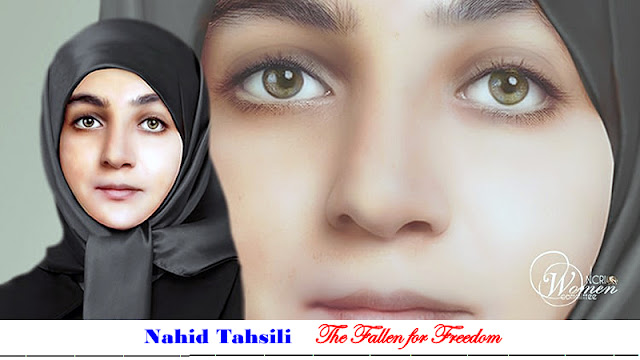Nahid Tahsili
The Fallen for
Freedom
Tahsili family’s picture is right in front of
me. The pictures of each of the four family members are in tiny frames on
the necklace of their mother.
Nahid was around 19 years old and the last child in her family. In August 1981, she along with her older sister, Fahimeh, and two brothers, Hossein and Hamid were arrested by the revolutionary guards because of their support of the People’s Mojahedin Organization of Iran (PMOI/MEK) and were taken directly to the Evin prison.
The first time I
saw Nahid was at the beginning of 1982 in Ghezel Hessar prison. In the
overcrowded prison ward, I soon learned about her situation from other
prisoners. She had an adorable character. In addition, her courage and
determination against the prison guards had turned her into one of the most
popular and admirable people in prison. We all learned from Nahid’s precise
planning, strength and seriousness at work, patience, and modesty.
We could see the
scars of torture on her body. The blows of the lashes had lacerated her feet.
They had to locally patch up her feet in the prison’s clinic by stitching the
skin from her thighs to the soles of her feet. Her thighs and feet were
deformed and wrinkled. However, Nahid kept her resilience and did not cave into
the hardships she endured under torture.
Nahid’s patient face reflected her unspoken words. She
talked to me about her family.
Her sister, Fahimeh, a medical student at the University of
Tehran, was executed in 1981, a month after her arrest, only for providing
medical assistance to the PMOI. Her brother, Hossein, was also executed
by firing squads in the same year. And now Nahid and Hamid, an
engineering student at the Sharif University of Technology, were sentenced to
10 years in prison.
Nahid Tahsili was transferred to Ghezel
Hessar’s punitive ward 8 for some time.
In 1983, Haj Davoud Rahmani, a
notorious interrogator, initiated a torture chamber called “cage or doomsday” to break the resistance of PMOI prisoners.
Nahid and several other prisoners, including Mahdokht Mohammadzadeh and Sepideh Zargar, were transferred to the new
torture chamber.
However, they endured the most complex and painful conditions for
six to seven months and did not give in.
In 1984, Nahid Tahsili received her sentence,
which was to end in the summer of 1986.
As we had expected, a new wave of crackdown began at the beginning
of 1986. The authorities of Ghezel Hessar transferred group after group of
prisoners to Evin Prison for punishment. I was in a group which included Nahid Tahsili, Zohreh Haj
Mir-Esmaili, Tahmineh Sotoudeh, and Fereshteh Hamidi.
From the first hour of our arrival, one of Evin’s torturers named Mojtaba
Halvaii attacked and beat us with his guards. Even inside the wards, the
guards and a few defectors would beat us. We would try not to leave our room
for the first few days to avoid conflict with the defectors. When we left the
room, we would leave in teams of two or three. Nahid and I would firmly hold
each other’s hands and leave the room together.
In 1986, they called Nahid and several other
prisoners for interrogation. All of them, including Sepideh Zargar and Forouzan Abdi, had finished serving their sentences. The interrogators told
them that the condition for their release was to do a television interview,
which they refused.
After a while, the prison authorities called them again. This time
they told the prisoners to write a letter denouncing the PMOI. They refused,
again.
For the last time, the authorities told them to write a pledge
denouncing any political activity after they were released. But Nahid and her
friends refused to do so and returned to the ward.
In autumn 1987, they transferred Nahid Tahsili and 100 other
inmates to Hall No. 1, a punitive ward where prisoners were confined inside
closed rooms and deprived of fresh air. They were only allowed to use the
washrooms three times a day.
In mid-May 1988, after seven years in prison, I received a
temporary leave of prison. I used an excuse to find my way back to my
cellmates, to say goodbye, even if it was from behind bars.
Amidst everyone’s cries, Nahid recited a poem: ”Send our greetings to all the blossoms and the rain” referring to our friends outside.
Nahid Tahsili and her brother,
Hamid Tahsili, were among the thousands
of
political prisoners hanged in the 1988 massacre.
Author: Mina Entezari



No comments:
Post a Comment